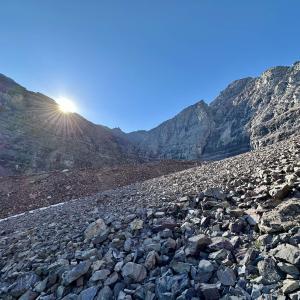Advancing Climate Adaptation Through Partnership and Innovation
Date
The North Central Climate Adaptation Science Center (NC CASC), based at the University of Colorado Boulder and part of a national network of regional CASCs, helps natural and cultural resource managers prepare for and adapt to the impacts of a changing climate. It covers a seven-state region: Colorado, Wyoming, Montana, North Dakota, South Dakota, Nebraska, Kansas, and the Tribal lands within them, bringing together scientists, Tribal partners, resource managers, and decision-makers to co-produce actionable science. The NC CASC’s work spans scientific disciplines and ecosystems in the North Central region from mountains to sagebrush to grasslands, and addresses management issues including habitat loss, connectivity and transformation, water resources, wildfire, and invasive species.
The Center’s mission to deliver science to help fish, wildlife, water, land, and people adapt to a changing climate is simple but powerful: it connects cutting-edge climate adaptation science with real-world management decisions. Through programs like the Rapid Climate Assessment Program (RCAP), Working Group Science Syntheses, and cross-regional collaborations, the NC CASC develops the science, data, tools, and partnerships needed to support climate resilience across the North Central region and beyond.
The NC CASC’s first year under the new cooperative agreement (October 1, 2024 - September 30, 2025) marked a period of growth and collaboration. By re-engaging long-standing partners and welcoming new ones, Year 1 solidified a strong foundation for cross-regional collaboration with our six Consortium Partners, the U.S. Geological Survey and the broader CASC network. During Year 1, the NC CASC navigated staff transitions and funding complexities while still delivering high-impact outputs, proof of the Center’s commitment, resilience and teamwork. Towards this end, Year 1 activities focused on translating collaboration into action through new research initiatives, capacity-building workshops, and expanded outreach efforts.
The Rapid Climate Assessment Program (RCAP) is a cornerstone initiative for the NC CASC, designed to respond quickly to evolving science needs of our partners. “We designed the RCAP to accelerate our key science priorities, to collaborate more closely with our federal, state, and Tribal partners, and to provide graduate students with an opportunity to do interdisciplinary, actionable science, which is experience that many students want but don’t necessarily have a chance to do in their degree programs”, says Heather Yocum, NC CASC’s social science lead and RCAP coordinator. RCAP’s projects bring together university researchers, graduate students, USGS scientists, Consortium Partners, and regional managers to co-produce decision-relevant assessments and science syntheses that inform conservation and resource planning.
The Sagebrush Working Group Science Synthesis is a collaborative effort with science experts and managers, connecting climate projections, ecosystem modeling, and management priorities to inform future management across the eastern sagebrush biome in our region. The synthesis is developing scenarios of future climate and ecological change as well as a menu of adaptation actions for resource managers to better anticipate and prepare for climate-driven shifts in habitat quality and connectivity. According to NC CASC ecologist, Kyra Clark-Wolf, "Working groups like this one do more than just help us understand science needs - they build buy-in, bring a range of experience and expertise, and perhaps most importantly bring our partners in as true collaborators in our work. It's really special when a group coalesces; it's not just the products that make an impact, but the process itself."
The Traditional Ecological Knowledge (TEK) and Ethical Space Workshop was one of the most meaningful activities of the year. The workshop sessions provided an introduction to the practice of Ethical Space and insights through the Indigenous lens that are critical to advancing our ability to develop authentic partnerships with Tribes, by emphasizing mutual respect, trust-building, and shared leadership in co-producing adaptation science solutions.
As the NC CASC enters its second year, it will continue strengthening partnerships, expanding communication platforms, and co-developing actionable adaptation science with partners across the region. Deputy Director Jane Wolken notes that, “As the NC CASC kicks off Year 2, the Center has the momentum to grow climate adaptation services in the North Central region." By amplifying stories of resilience and collaboration, the Center will not only advance climate adaptation science but also inspire broader conversations on how knowledge can shape a more sustainable future. These efforts ultimately benefit everyone, from land managers and Tribal nations to farmers, city planners, and citizens, by providing the information and tools needed to make informed decisions in a changing climate. Together, we can turn shared understanding into the co-development of adaptation science solutions for practitioners in the North Central region and beyond.


